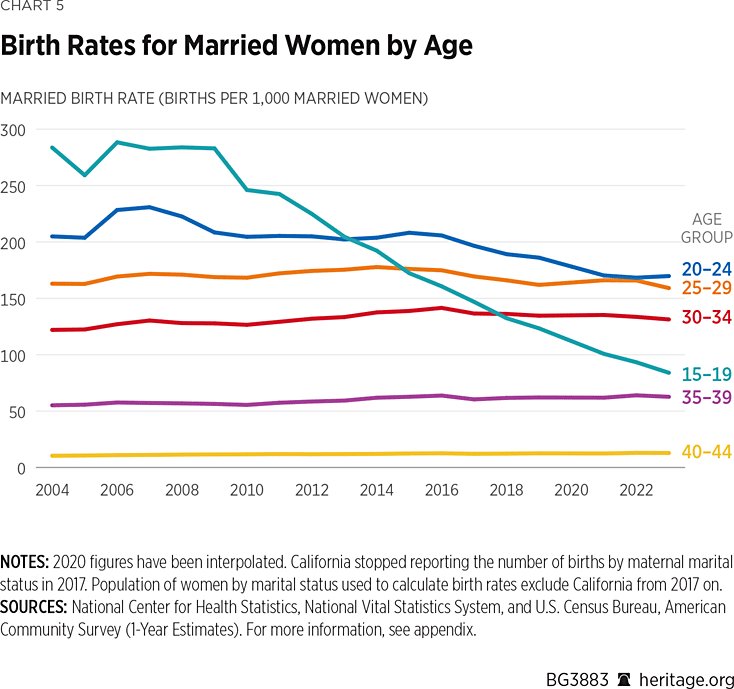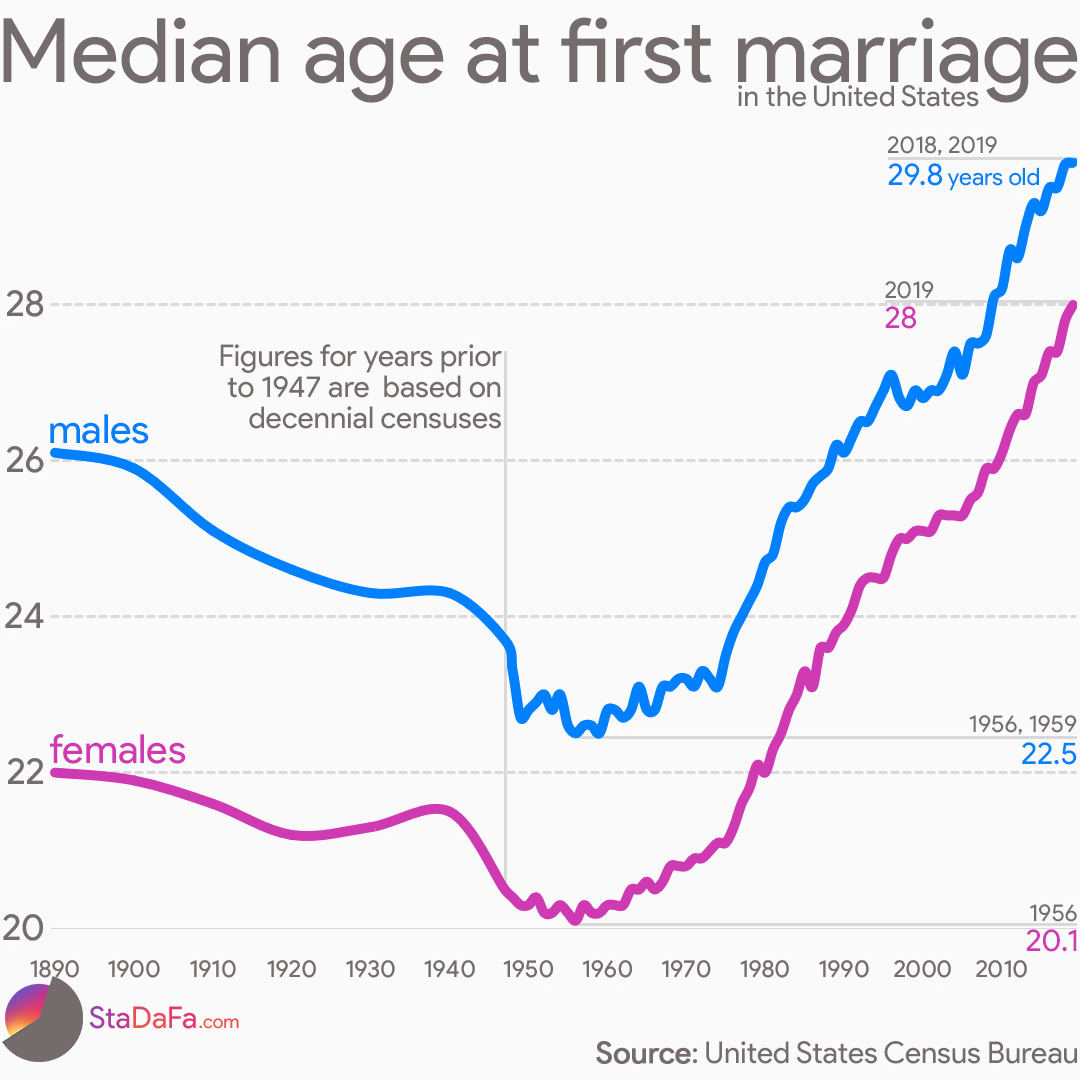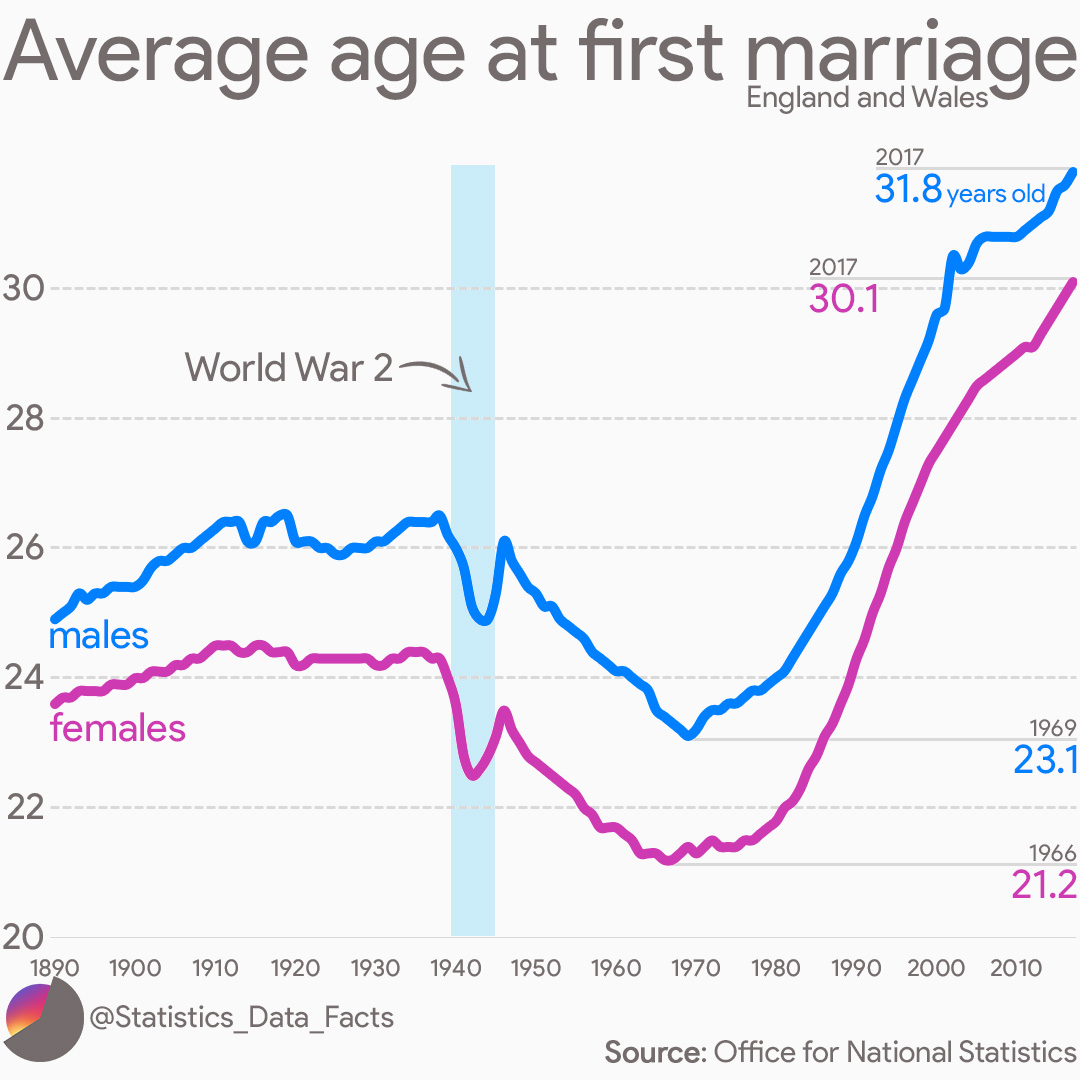This is part of a series. See the index here.
This is an ideas blog. But it’s not just any ideas blog. We are data driven. This is why, during the now 16-part series, we have firmly rejected hypergamy: it fails empirical verification.
Recently in society there has been a lot of talk about low fertility and what it means. A lot of opinions have been thrown around for what the causes might be, including falling testosterone and sperm counts. But the answer is quite simple:

Relatedly, this evidence has persuaded me childless women aren’t the problem. Rates of childlessness are roughly the same today as they were in western European history.
The bigger problem is increasingly delayed family formation and smaller family sizes.
Understatement. Almost the entire problem is late marriage. Look at fertility rates by age for only married women – they are stable. Delaying marriage = you miss out on the early years of fertility and end up with fewer kids
The entire solution is women get married younger.
The difference in fertility is almost entirely due to late marriage. In terms of biology, women are evolved to have multiple children in their late teens to mid twenties. But half are not even getting married until that period is already past. The opportunity cost of choosing late marriage is fertility.
Now, consider that the average age gap between married couples has been fairly consistent over time, around 2 years.


This means that the solution entails both women and men getting married younger.
First, one of the more regressive ideological positions of the Manosphere is the strong belief that men should not marry young. This is, purportedly, for the purpose of protecting men from divorce, but it’s misguided. As we pointed out in “A Case Study on Marriage,” marrying young is extremely important. Those who believe that men should delay marriage are being fooled by statistical confounding into choosing the worse outcome: higher divorce rate.[1] And, of course, it results in lower fertility (and contributes to a higher average age of first marriage for men and women).
Second, there is also a similar belief in the Manosphere that men should marry at a later age, but also try to marry a much younger woman. This is F. Roger Devlin’s position, and it’s a silly one. While large age gaps happen, this is uncommon and likely to decrease a man’s chance of marriage and increase a man’s odds of divorce. Telling a man to delay marriage while aiming to marry a younger woman is foolish. It’s a recipe for disappointment and disillusionment. The average 32-year old man is going to have a very hard time finding a young, fertile wife. He’s much more likely to get stuck with an older woman and either have to adopt her children (from a previous relationship) or content himself with fewer (or no) children.
Third, as we’ve noted that hypergamy is a myth, we have also noted that proponents of hypergamy believe that one instantiation of hypergamy is women who choose older, established, elite men.[2] This is a common belief in the Manosphere, but it isn’t reflected in any marriage data. If anything, women in the last few decades have narrowed the average age gap somewhat, either by choosing to marry closer to their own age or, increasingly, by choosing to marry younger men. It is as common as it ever has been to see a woman marrying a younger man.
In short, the Manosphere misdiagnoses the problem and provides wrong—even counterproductive—attempted solutions. One of the key costs of this error is lower fertility. The Manosphere—like feminism it opposes—are both part of the problem.
For many years, I have been consistently advising men to buck the trend; to prepare and marry as young as possible. This is the way—the only way—for society to achieve higher fertility. There is no other solution to childlessness. All other political and cultural efforts to fix low fertility will fail.
Footnotes
[1] Men who find themselves delaying marriage are also likely to find themselves as having higher intelligence. But this doesn’t mean that it is more intelligent to delay marriage, only (the converse) that the more intelligent delay marriage. Sure, the less intelligent are marrying younger, but this isn’t prescriptive or relevant for you. When controlling for intelligence, the earlier marriages are more successful than much later marriages.
Put another way, if you marry young and end up getting divorced, you nevertheless would have been more likely to get a divorce had you waited to marry. You didn’t actually take a greater risk by marrying earlier, you just played the odds and lost anyway.
[2] Ironically, if you take F. Roger Devlin’s view of hypergamy and his approach to delaying marriage, you see that this causes the very problem it is attempting to solve: women are encouraged to be more “hypergamous” and to avoid assortatively pairing with similar-aged partners because the best men are delaying marriage. Logically, if the best men are delaying marriage, the best women will do so as well in order to eliminate the age gap. The result of delaying marriage—whether male or female—is necessarily lower fertility. Moreover, hypergamy isn’t really possible if the best men are marrying young.

Interesting. The Christian side of the ‘sphere usually encourages men to marry young (except their sons of course…..)
The platform and table they set is: As a kid work really hard in school, be an expert at math and science. Every post in the Christian ‘sphere is “I knew I wanted to be married someday at age 6…so it was my purpose or whatever”
Of course by the time a boy is a teenager he should be getting A’s in school (because its very, very easy to do so today) and he should be running a business, be an expert in a sport or sports. Should be a leader in the church, and of c ourse….be very above average looking. Its easy. Anyone can do this…….and if you dont or cant….well, you’re lazy, not a real man…stuff like that.
By the time a teenage boy is college age. He should not go. He should be running a successful business by this point or he should become a lineman because in two years you will be making 400K a year. He should be very popular with all the “good” girls and should be easily able to “pick” the one he wants to marry. Very simple.
While dating, he is to tell his “life purpose” clearly to the girl, and she will understand or he “kicks he to the curb” for “red flags”. They have to complete “financial peace university” together while dating….and she doesnt agree, kick her to the curb…..she is obviously a “gold digger” and “has typical female nature”
By the time he 22, he should be married, getting married or spinning plates to determine which one is the best to marry (usually the hottest).
This is very easy for a young man to do. Dont you get it? How come you didnt do this? How come your son isnt running a 2 million a year landscaping business that he should have started when he was twelve???
Hyperbole of course but this is what I have grasped and have seen said in the comments over the decade or so.
Very easy to do. If you have Jesus as your Lord and Savior……..he will guide you. If you dont have life figured out by age 15…you obviously dint “trust” Him enough or you “really didnt believe”
Very interesting.
But – at a deeper level – I can’t see it as a good life strategy to be guided by statistics! (not least because all stats are retrospective). But good and relevant data may be evidence towards a better understanding of the phenomenon – which is good.
Nor do I think that our personal decisions really make a difference at a a societal level.
One of the things I most dislike about the manosphere, and also about Christian churches who opine on marriage, is the “ecological fallacy” of trying to construct a standard model of what we each ought to aspire to do.
And I think the attitude of classifying the opposite sex in terms of attributes is mistaken.
On a positive note; I think Christians need to internalize that marriage is between two persons, that we are each looking for that one other person.
Some of the most durable and apparently good marriages are between two people neither of whom has had another girlfriend/ boyfriend. The two have never dated, they “find” each other – and that’s that.
It isn’t a statistical process – it seems to be a matter of each having the right attitude and preparedness; of being ready.
Those who believe God is real must allow him to do his work; and helping us find that person to marry is (surely?) part of God’s work. Of course, we must do the right things to help, and both must consent and desire the marriage – but the right thing is not necessarily going to be dating a lot of people who fit certain criteria!
It may be patience. I don’t been patience to delay marriage to middle age, but the simple patience not to demand satisfaction Now, not to be seeking gratification Tonight. Such sex-driven impatience is natural and spontaneous to a considerable degree (amplified by alcohol), but it is also a Very bad strategy.
The right thing to do to get married isn’t a checklist, whether that is derived from valid stats or mistaken beliefs; but instead something that may presumably be knowable with the help of divine guidance as well as our best efforts – if such guidance is sought.
It is far easy to prove something wrong than it is to prove something right. In certain cases the former requires only a single counter, while the latter requires near infinite knowledge. Statistics and data are most useful as this…
…rather than this:
They are best at telling us when we are headed the wrong direction rather than directing us where to go.
So yes, this is obviously true…
…but the truth of this does not entail a rejection of reasoning with statistics and data. An acknowledgement of the limitations is sufficient, I think.
And I think the attitude of classifying the opposite sex in terms of attributes is mistaken.
I wrote about this confusion a while back in “Masculinity and the Manosphere: Part 3.” The way it defines masculinity and femininity as this-or-that set of attributes is fundamentally flawed and leads to paradox.
Just catching up on some of the posts.
Certainly artificial contraception also plays a big role. We started dating in our late teens but didn’t marry until 25/24. We ended up with 8 children because we refused to use hormonal birth control and contraceptive devices. Prior to 1930 (Lambeth) Christendom appeared to be united on this.
In both sets of my grandparents the M/F marriage age gap was 7 years and all my great grandparents had similar age gaps. Their socio-economic backgrounds were varied – doctors and lawyers on one side, Appalachian blue-collar on the other. I wonder how reliable the older data is – the chart says pre-1974 data may be less reliable.
I am in very strong agreement that marriage should be young. But I could see a man who wants to become e.g. a doctor marrying a considerably younger woman when he’s in his mid to late 20s. I guess you could be married and in med school or residency at the same time.
Whether it shows in the statistics (are the older stats accurate?), I think you see more outliers with large male-female age gap. I knew a couple where a 60 year old man (not rich or a “silver fox”) married a 30 year old woman and there’s a couple a church (very devout wife) with an 18 year age gap. I’ve never seen the reverse in real life. If you google John Archer’s sex differences studies (a meta analysis that quantifies M/F behavior and psychological differences with Cohen’s D) you’ll see that one of the largest psychological differences in men and women is openness to age difference where the man is older.
Sorry – for clarification – we refused to use birth control after we married. BTW, it was a sola scriptura Lutheran, not a Catholic, who convinced me contraception is intrinsically wrong.
It’s a good question, but not relevant to hypergamy. If hypergamy is some universal principle that applies in all times and in all spaces to all women, then the changes to these statistics that have taken place over the last two decades are still valid.
If the statistics show that “hypergamy” is a new phenomenon whose validity is subject to decade-on-decade cultural swings, then whatever that “hypergamy” is cannot be the universal principle that it is supposed to be.
So, your question is implicitly asking “Is Hypergamy a myth?”